Climate and Infrastructure
Air Date: Week of May 28, 2021
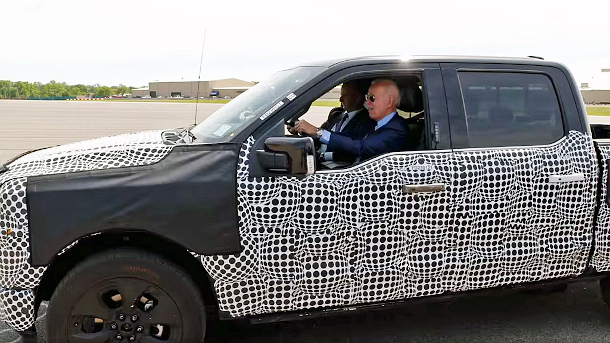
President Joe Biden test drives the Ford F-150 Lightning all-electric pick up. (Photo: The White House, public domain)
President Joe Biden’s proposed $2 trillion infrastructure bill presents a rare opportunity to pass climate-related legislation through Congress. But it won’t be easy. Harvard economist Joe Aldy advised President Obama on energy and the environment and joins Host Steve Curwood to explain how parts of infrastructure legislation could improve climate protection, and the political hurdles of getting it passed.
Transcript
CURWOOD: From PRX and the Jennifer and Ted Stanley studios at the University of Massachusetts Boston, this is Living on Earth, I’m Steve Curwood.
President Joe Biden has been using the bully pulpit and executive authority to put the US on a path towards cutting climate changing emissions 50 percent by 2030. For example, the president recently got behind the wheel of the new electric ford F-150 pickup truck to show off its rapid acceleration and potential for jobs creation, as many will be bought for the federal fleet. But for more enduring climate protection measures the president is looking to his $2 trillion infrastructure bill, the American Jobs Plan. The Democratically controlled House has already passed it but the Senate’s arcane rules including the filibuster limit the opportunity for Vice President Kamala Harris to cast a tie breaking vote in favor of the Democrats if there is no Republican cooperation for a budget resolution. Here to explain how infrastructure legislation could improve climate protection and the maneuvering to get it passed is Joe Aldy. He’s a Harvard economist who advised President Obama on energy and the environment. Welcome back to Living on Earth, Joe!
ALDY: Thank you, Steve. It's a pleasure to be here.
CURWOOD: So it's highly likely that the infrastructure package, the main infrastructure package, at least is going to be done by the Democrats using the budget reconciliation process. So what are the major things that Biden can pass this way to deal with the climate and the environment?
ALDY: So I think the key thing to recognize about budget reconciliation is that it's focused on how the government spends money. And that can be how we do that in the appropriation of funds, through government programs. And it can be how we use the tax code. So how we might cut taxes, or how we might provide tax credits for specific kinds of investment that might benefit the environment and the climate. I think there's clearly an opportunity here to continue to support the build out of renewable power in the electric sector. When we think about President Biden's goals to decarbonize the economy by 2050, to decarbonize the power sector by 2035, to get down to zero emissions of carbon dioxide by 2035, virtually any scenario you consider to get to that goal requires a major build out of renewable power. So you could use tax credits for investment, tax credits for production of power from solar, from wind and other renewable sources to help make significant progress towards that goal.
CURWOOD: The President has talked a lot about electric cars, electric trucks; in fact, he made a big point of driving one and pointing out that his dad had been a Ford dealer back in the day, or been a Ford dealership manager. So I'm guessing that these half million electric vehicle charging stations could, should, would be part of this package.
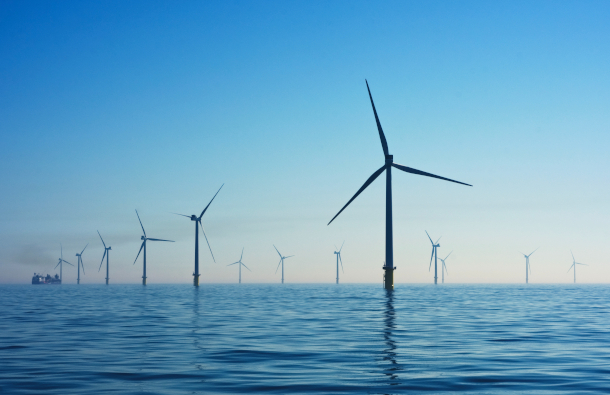
An offshore wind farm. Wind and solar energy tax credits passed using budget reconciliation could help rapidly expand renewable energy. (Photo: Nicholas Doherty on Unsplash)
ALDY: I think we'd certainly see a major push on electric vehicles in a, an infrastructure package. As you noted, President Biden did like how fast that Ford F-150 took off when he floored it. But I think it's gonna be a key role for how we think about the long term climate goals, is to substitute in clean electricity in our light-duty transportation -- in our cars, and our light trucks -- for gasoline and diesel vehicles. So I think you'd see a big push in that as well in an infrastructure program, to build out the charging infrastructure, which I think is important to get people more and more comfortable with the idea of owning an electric vehicle. You know, we've become accustomed here in the United States that on almost any corner, you might be able to find a gasoline station. So you never really worry about running out of gas. And I think we need to have a dense enough charging network so people have the same kind of assurances if they own and operate an electric vehicle.
CURWOOD: And there's a way to do that with the financial part of legislation that would be in a reconciliation bill for infrastructure.
ALDY: Right. So I think you could do a lot that is a combination of both tax credits through the tax code, that helps to leverage private resources. So you make it easier for someone who's going to go buy a new vehicle to decide that they're going to make that switch to electric vehicles. But you can also have specific programs run by government agencies that can help build these out. So you could imagine, say, the Department of Transportation, doing more to help ensure that we are building out EV charging in places that helps ensure that that network is meeting the demand, and the emerging demand, for electrification in transportation.
CURWOOD: Let's talk about fossil fuels directly for a moment, Joe. To what extent do you think a reconciliation-styled measure for infrastructure would address matters regarding coal?
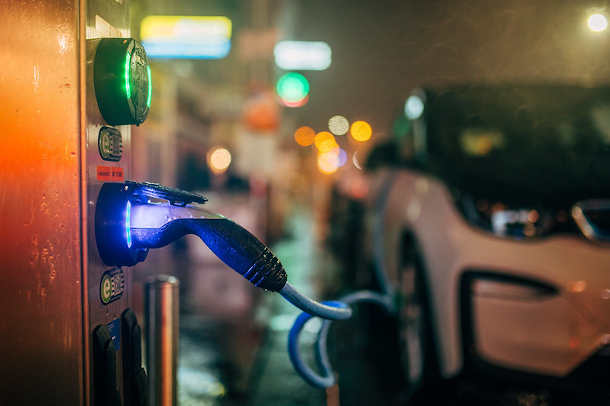
President Biden proposes to build a national network of 500,000 EV charging stations. (Photo: Ivan Radic, Flickr CC BY 2.0)
ALDY: So here's where I think it gets interesting to think about the politics of getting the entire Democratic caucus online if you're going to use budget reconciliation. That means you have to have something that Senator Manchin of West Virginia recognizes is in his interest and in the interests of his constituents. And so I can imagine that part of what would be done in an infrastructure package that's focused on climate is also to think about what one can do to help build out infrastructure and create jobs in those communities, especially say in West Virginia, that have long relied on the fossil fuel industry for employment. So we may see programs, sometimes the under the umbrella term of a just transition, that helps try to create new employment opportunities in alternatives to coal. But we need to think about this as well, I think, longer term, as an opportunity in those parts of the country that rely on oil and gas. So I think there's certainly an opportunity here to make some investment, whether it is a combination of job training and apprenticeships, whether it's trying to think through ways of dealing, say, with abandoned coal mines. There's been some discussion about that in the Biden White House of, of how to use workers from the fossil fuel industry to help clean up these legacy environmental problems from abandoned coal mines and abandoned oil and gas wells, that there may be opportunities here in the near term for employment to make the environment cleaner, but also help enable that kind of transition to new industries and new occupations in these communities and regions of the country that have long relied on the fossil fuel industry.
CURWOOD: What's the role of natural gas in what the White House is proposing for the infrastructure bill?
ALDY: So I think for natural gas, there is one, the need to deal with and manage methane. The fugitive emissions of methane, when we think about oil and gas operations, the potential for some methane leakage when we move natural gas. Some of that might be something that doesn't necessarily need to go through a legislative package, it could be through EPA regulation. I think the other question is how we might be able to use spending in an, in an infrastructure package to try to advance carbon capture technologies. And this may be one of those things where in order to keep all 50 members of the Democratic caucus online, you might need to do something here to say, there is a potential future for natural gas if they can eliminate their CO2 emissions. That may be something that is consistent with your long term climate goals, and addresses your near term political calculus of what do you need to do to keep a few of the swing votes on your side in the Senate. And for that matter, potentially even in the House, because we've been talking all about the Senate. The House is pretty closely divided as well. So it may be that something on carbon capture and storage for natural gas, could be something that, that keeps some of the, you know, the moderate Democrats from Western Pennsylvania, President Biden's second home state, happy in the House, as well as something that you might be able to use as a way to engage and keep Senator Manchin on board in the Senate.
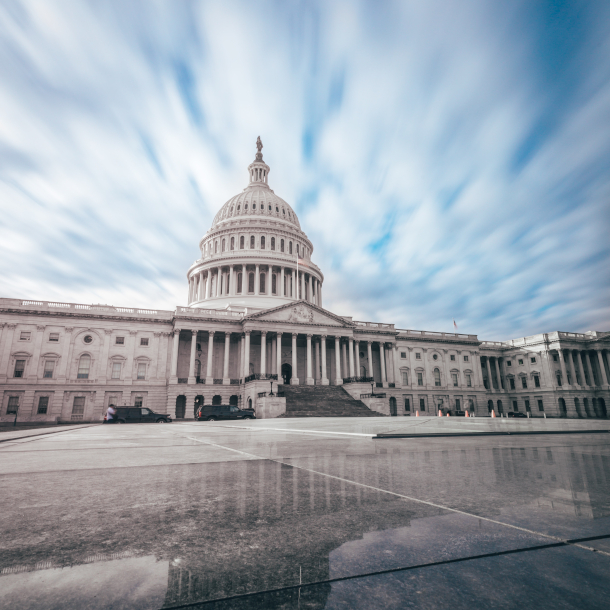
Republican and Democratic party rhetoric on climate change has grown much farther apart in just the past decade. (Photo: Andy Feliciotti on Unsplash)
CURWOOD: You mentioned Senator Joe Manchin from West Virginia, the Democrat there. And because the Democrats have such a razor thin majority, they need to bring him along for something being done with 51 votes, or for that matter, if there's ever to be a bipartisan agreement, clearly, Senator Manchin would be key in those negotiations. All this talk that so much depends on on one particular individual echoes the criticisms that some make that our system is well, frankly, kind of broken these days, that this is hardly democratic, if one particular Senator seems to hold all the cards.
ALDY: Well, that is what happens, I think, when you have a 50-50 Senate, and you have a Republican party that really only knows how to say the word "No." You know, when I look at this, I think this is emblematic of a larger problem that we have with our politics, that it is very difficult to constructively engage the Republican Party on anything on public policy that's not cutting taxes. I don't think they're really that serious about engaging on infrastructure despite the rhetoric we heard during the 2016 campaign, and early in the Trump administration, that they actually wanted to do something on that. It's baffling to me when I look back at, say, 2008. You know, as you noted, I worked for President Obama and in the 2008 campaign, there was virtually no difference in the policy prescription and the long term goals on climate change between the Republican and the Democratic candidates for president. They couldn't have been more different in the 2020 campaign. And so it's just, it's fascinating to me how we've seen this, this divergence on climate and on other issues between the two parties, that has been truly a barrier at the federal level. And I think that this is something where we see a crisis here, certainly on climate change. But the barrier to delivering a meaningful response to climate change is the crisis in our democracy.
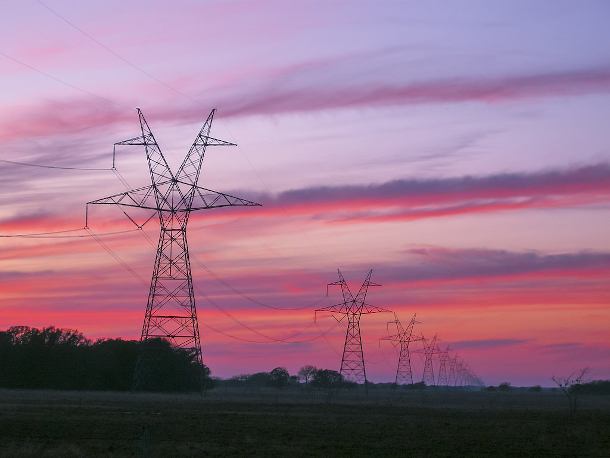
The nation’s transmission and energy storage capabilities need a major upgrade in order for renewable energy to reliably provide 80% or more of the power on the grid. (Photo: Matthew T Rader, Wikimedia Commons CC BY-SA 4.0)
CURWOOD: Joe, what climate policies has the President talked about wanting that are on the edges of what could be included in a reconciliation or, in fact, highly likely to be left out? What things might America miss from the perspective of the Democrats, if they use this budget reconciliation process now to move forward with infrastructure, in terms of climate?
ALDY: The challenge with using budget reconciliation is that if you want to do something that requires regulations, that's really hard to satisfy the rules of reconciliation. Like I said, reconciliation is focused on spending. So if you want to create a new regulatory authority, you typically have to use a different legislative vehicle than a reconciliation package. And that means you probably lose what I think is the single most important sentence in the Biden infrastructure proposal. And that is for a clean electricity standard for the US power sector. This is, I think, the most important policy to try to deliver on the President's goal of zero carbon emissions in the power sector by 2035. It is something that I think is critical for sending those long term signals the private sector needs to build out new renewables, but also to build out the other technology to complement renewables, whether it's new transmission or large scale storage of electricity so that we can have a power system that relies on a dramatically scaled up role for renewable power. And so that, that to me is the single biggest issue or policy that's in the Biden proposal that would likely fall out under a reconciliation package.

Joe Aldy is an economist and professor of public policy at Harvard’s Kennedy School. (Photo: Courtesy of Joe Aldy)
CURWOOD: Joe Aldy is an economist and Professor of Public Policy at Harvard's Kennedy School of Government who advised President Obama on energy and the environment. Professor Aldy, thanks so much for taking the time with us today.
ALDY: Thank you Steve. I've enjoyed it.
Links
Center for American Progress “How the American Jobs Plan Delivers Climate Action”
E&E News | “Infrastructure: Democrats Losing Patience with Bipartisan Talks”
Living on Earth wants to hear from you!
Living on Earth
62 Calef Highway, Suite 212
Lee, NH 03861
Telephone: 617-287-4121
E-mail: comments@loe.org
Newsletter [Click here]
Donate to Living on Earth!
Living on Earth is an independent media program and relies entirely on contributions from listeners and institutions supporting public service. Please donate now to preserve an independent environmental voice.
NewsletterLiving on Earth offers a weekly delivery of the show's rundown to your mailbox. Sign up for our newsletter today!
 Sailors For The Sea: Be the change you want to sea.
Sailors For The Sea: Be the change you want to sea.
 The Grantham Foundation for the Protection of the Environment: Committed to protecting and improving the health of the global environment.
The Grantham Foundation for the Protection of the Environment: Committed to protecting and improving the health of the global environment.
 Contribute to Living on Earth and receive, as our gift to you, an archival print of one of Mark Seth Lender's extraordinary wildlife photographs. Follow the link to see Mark's current collection of photographs.
Contribute to Living on Earth and receive, as our gift to you, an archival print of one of Mark Seth Lender's extraordinary wildlife photographs. Follow the link to see Mark's current collection of photographs.
 Buy a signed copy of Mark Seth Lender's book Smeagull the Seagull & support Living on Earth
Buy a signed copy of Mark Seth Lender's book Smeagull the Seagull & support Living on Earth

